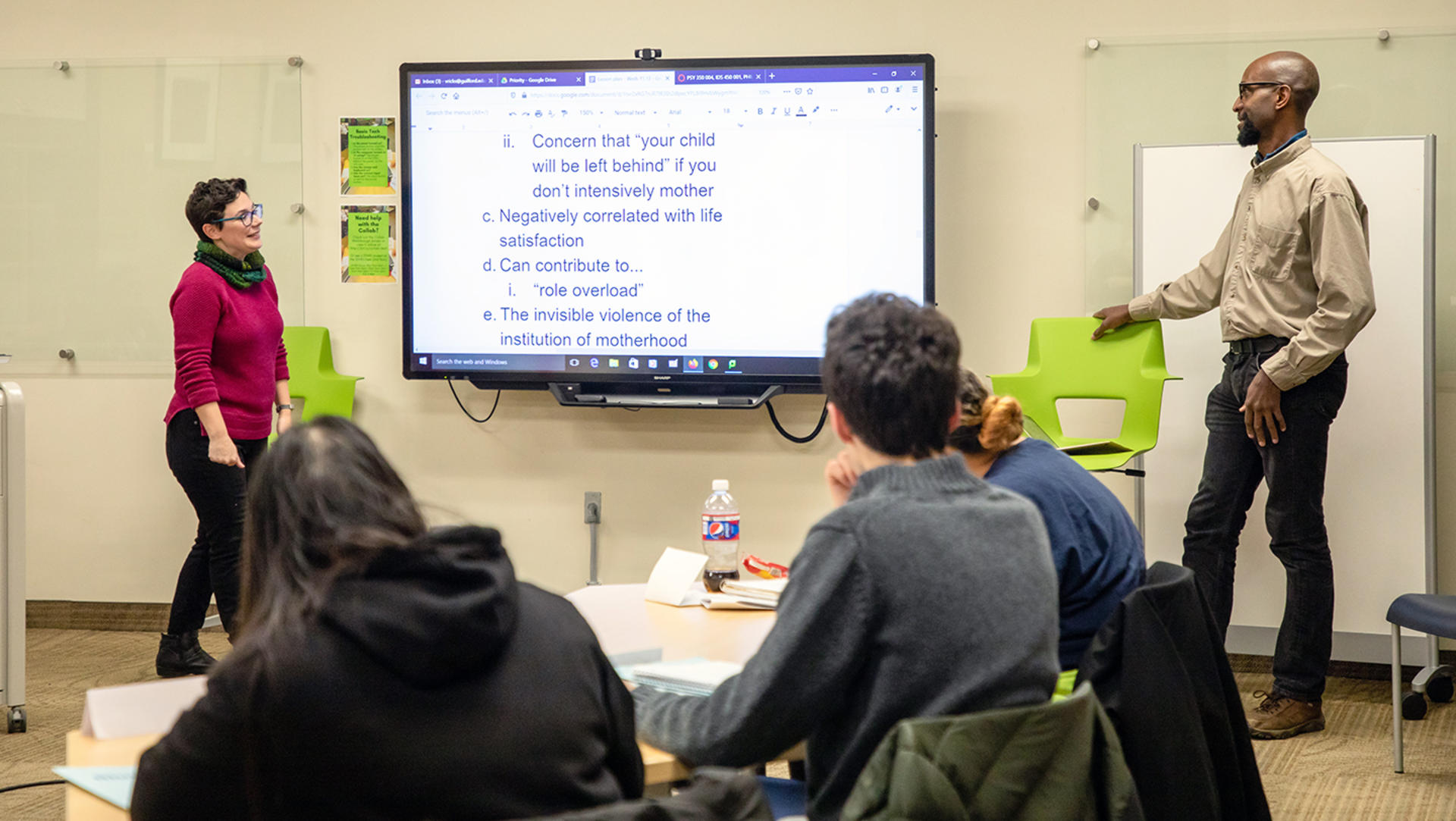
Assistant Professor of Psychology Rachel Riskind and Associate Professor of Philosophy Vance Ricks recently teamed up to teach a new 12-week course on the perspectives of parenthood.
“I hope students will be more thoughtful, whatever they decide, about their own parenting decisions. Or if they are already parents, maybe this is giving them some extra tools — conceptually, theoretically, and emotionally."
Made possible by the Guilford Edge and the Andrew W. Mellon Foundation grant, “Psychology and Philosophy of Parenthood” dives into the tough issues facing families and parents today. “We now have a curriculum and funding that make team teaching much easier and better supported,” Vance says.
A healthy mix of multiple disciplines, the class goes beyond psychology and philosophy to touch on a variety of subjects including sociology, history, and biology. Starting out with theory, methodology, and family foundations, students use these concepts to inform discussions on societal issues relating to how family structures influence child development, what constitutes a neglectful parent, what it means to be a good parent, and whether anyone should have children in the first place.
Beyond the parent-child relationship, the class prepares students of all disciplines for their professional lives. “There are so many careers that interact with parents and their children. It’s harder to say a career that this topic doesn’t affect,” Rachel says.
Students are reminded that when they enter the workforce — even if their field is not directly related to parenting or child development — they will most likely have a supervisor, co-worker, or subordinate who is a parent or potentially taking care of their own parents. One main goal of this course is to prepare them to make informed decisions regarding familial obligations, public obligations, and policies both in their personal and professional lives.

Discussion and Appreciation
One topic that sparked student discussion is the question of whether or not parents should be able to raise their children with their own values, even if those values are ethically corrupt, and when society or the state has a right to intervene in a parent's behaviors or decisions, if ever.
“My appreciation for the wealth of moral, legal, social, and practical factors that are involved in parenting has expanded greatly. Taking ‘Parenthood’ has helped me realize that the relationship between a parent and their child is one of the most, if not the most, fulfilling, exhausting, important, and above all complicated relationships that can possibly be had,” says Philosophy major Fletcher Brooks ’20.
These questions directly relate to many of the students’ professional interests as well. “We have a number of Psychology majors who are interested in becoming therapists. ... We also have Criminal Justice majors who are thinking about the state’s role in preventing abuse and neglect and what that will mean for them in their future careers,” Rachel says.
“In terms of career aspirations, I have always wanted to be involved in a nonprofit or an organization that addresses social issues. Taking this particular class has served to strengthen that conviction,” Fletcher adds.
Mentorship and Respect
Outside of the classroom, it can be tough to manage logistics and expectations when co-teaching a course, but Rachel and Vance say they have developed a fantastic working relationship.
“I really like and respect Rachel as a friend and colleague. So being able to teach with her, I’ve just enjoyed that opportunity and that experience,” Vance says.
“I would echo that 100 percent,” Rachel says. “The kind of mentorship that you can have when someone is in the classroom with you is really different. I’ve learned a lot from what Vance is doing, inside and outside the classroom.”
The pair have created a dynamic environment where students are excited to dive into the deep issues covered in the course.
“This team, in particular, combines strong backgrounds to accentuate various components of the class. Together, the concepts are explored in a much more encompassing way than they would be taught singularly,” says Psychology major and Criminal Justice minor Kara Perry ’20.
Are you ready to explore your passions as you work side by side with peers and professors to tackle real-world issues? To learn more about Guilford’s collaborative learning experience, schedule your personalized visit to campus today.

